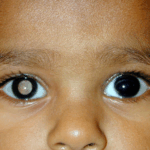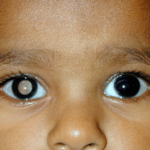
Paediatric Oncologist at the Korle Bu Teaching Hospital, Dr Samira Yamyolia, has called for increased awareness and early detection of retinoblastoma, a rare but curable eye cancer that affects children.
Speaking on the Joy FM Super Morning Show on Monday, October 27, as part of Joy Cancer Awareness Month, Dr Yamyolia explained that retinoblastoma is the most common primary eye cancer in children, usually affecting the retina, the part of the eye that helps transmit images to the brain.
“Retinoblastoma is a cancer of the eye in children. It primarily affects the cells in the retina and usually occurs before the age of five. The peak age at presentation is typically less than two years,” she said.
According to her, data collected at Korle Bu Teaching Hospital between 2018 and 2023 recorded 156 cases of retinoblastoma in Ghana.
Dr Yamyolia explained that while the exact cause of the disease is often unknown, some cases are linked to genetic mutations.
“For those that affect both eyes, there is usually what we call a germline mutation, and between 5 to 10% of these cases are hereditary,” she said. “Most, however, occur sporadically, meaning they just happen without any family history.”
She said the earliest sign of retinoblastoma is often a white reflection in the eye, known medically as leukocoria.
“You would find that the centre of the child’s eye, the pupil, appears white instead of red when light falls on it or when a photo is taken. It’s sometimes described as having ‘cat’s eyes’,” she explained.
“Another sign is when the child’s eyes begin to turn in different directions, a condition we call strabismus.
In some cases, the eyes may swell or protrude, but that usually means the disease is already advanced.”
Dr Yamyolia said that retinoblastoma is curable when detected early, with survival rates as high as 80–90% in advanced countries.
“In the early stages, treatment involves chemotherapy, followed by surgery or local therapy to save the eye. In some cases, chemotherapy can be injected directly into the tumour to preserve vision. However, if it has spread, surgery to remove the eye, which we call enucleation, may be required.”
She cautioned that when the cancer spreads beyond the eye into the brain or surrounding bones, the prognosis becomes poor.
Dr Yamyolia said diagnosis and treatment of Retinoblastoma involve a multidisciplinary team, including oncologists and ophthalmologists.
“We usually do an MRI scan to determine the extent of the disease and whether both eyes are involved. We also assess the optic nerve and bone marrow to check if it has spread,” she said.
She encouraged parents to visit hospitals with qualified ophthalmologists or paediatricians if they notice any abnormalities in their child’s eyes.
In Ghana, Korle Bu Teaching Hospital, Komfo Anokye Teaching Hospital, and Greater Accra Regional Hospital are the three main treatment centres for childhood cancers, with additional shared-care facilities in Tamale, Ho, Cape Coast, Agogo, and Techiman.
Dr Yamyolia also expressed concern that many childhood cancer cases in Ghana go unreported.
“We are only seeing about one-third of the expected childhood cancer cases. Many people still think children can’t get cancer, or they attribute it to spiritual causes. This delays diagnosis and treatment,” she said.
She urged parents to pay attention to unusual changes in their children’s health, including persistent fevers, unexplained weight loss, swelling in the stomach, or white spots in the eye.
“The earlier we detect it, the higher the chances of saving the child’s life and, in some cases, even their sight,” she said.
- President Commissions 36.5 Million Dollars Hospital In The Tain District
- You Will Not Go Free For Killing An Hard Working MP – Akufo-Addo To MP’s Killer
- I Will Lead You To Victory – Ato Forson Assures NDC Supporters
Visit Our Social Media for More



